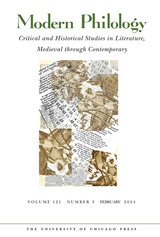10 start with O start with O

We speak of rights as though they are objective matters of fact that have a crucial bearing on how we ought to behave. Yet few, if any, rights are universally acknowledged without wide differences of meaning. Instead, they usually represent the particular ideals of the individuals or groups that claim them. Theories of rights have always grappled with this central problem, but none of the literature on the subject has offered a satisfactory solution. Lloyd Weinreb makes the first significant advance toward an understanding of what rights are, how they function in our lives, and why we need them.
Weinreb’s central argument is that rights are tightly connected to responsibility. They are the normative constituents of persons, attributes that we have rightly, as our due. As such, they enable us to overcome the antinomy of moral freedom and natural causal order. Without them, we could not regard human beings as persons, that is, as free and responsible, or autonomous. Since responsibility is a structural feature of our experience and a matter of fact, rights too are matters of fact.
Against a review of the current debates on the subject, Weinreb fully elaborates his original argument on the nature of rights and finds the source of concrete rights in the nomos, or deep conventions, of a community. Applying his theory, he shows how it helps to answer specific questions about animal rights, human rights—including, in the context of abortion and capital punishment, the right to life—and civil rights, including particularly rights of the handicapped, gay rights, and affirmative action in contemporary American society. Along the way, Weinreb shows that Oedipus and Roger Clemens have more in common than either would probably have supposed.
This highly original work will significantly redirect the study of rights. It will be especially valuable to those who practice or study law, philosophy, politics, and public policy.
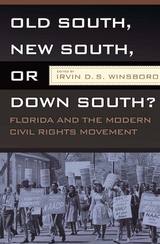
How does a state, tarnished with a racist, violent history, emerge from the modern civil rights movement with a reputation for tolerance and progression? Old South, New South, or Down South?: Florida and the Modern Civil Rights Movement exposes the image, illusion, and reality behind Florida’s hidden story of racial discrimination and violence. By exploring multiple perspectives on racially motivated events, such as black agency, political stonewalling, and racist assaults, this collection of nine essays reconceptualizes the civil rights legacy of the Sunshine State. Its dissection of local, isolated acts of rebellion reveals a strategic, political concealment of the once dominant, often overlooked, old south attitude towards race in Florida.
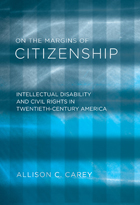
Carey addresses the segregation of people with intellectual disabilities in schools and institutions along with the controversies over forced sterilization, eugenics, marriage and procreation, and protection from the death penalty. She chronicles the rise of the parents’ movement and the influence of the Kennedy family, as well as current debates that were generated by the impact of the Americans with Disabilities Act passed in 1990.
Presenting the shifting constitutional and legal restrictions for this marginalized group, Carey argues that policies tend to sustain an ambiguity that simultaneously promises rights yet also allows their retraction.
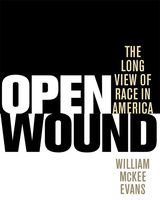
In this boldly interpretive narrative, William McKee Evans tells the story of America's paradox of democracy entangled with a centuries-old system of racial oppression. This racial system of interacting practices and ideas first justified black slavery, then, after the Civil War, other forms of coerced black labor and, today, black poverty and unemployment.
At three historical moments, a crisis in the larger society opened political space for idealists to challenge the racial system: during the American Revolution, then during the "irrepressible conflict" ending in the Civil War, and, finally, during the Cold War and the colonial liberation movements. Each challenge resulted in an historic advance. But none swept clean. Many African Americans remain segregated in jobless ghettoes with dilapidated schools and dismal prospects in an increasingly polarized class society.
Evans sees a new crisis looming in a convergence of environmental disaster, endless wars, and economic collapse, which may again open space for a challenge to the racial system. African Americans, with their memory of their centuries-old struggle against oppressors, appear uniquely placed to play a central role.
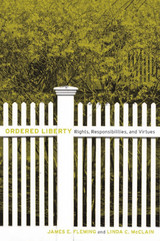
Many have argued in recent years that the U.S. constitutional system exalts individual rights over responsibilities, virtues, and the common good. Answering the charges against liberal theories of rights, James Fleming and Linda McClain develop and defend a civic liberalism that takes responsibilities and virtues—as well as rights—seriously. They provide an account of ordered liberty that protects basic liberties stringently, but not absolutely, and permits government to encourage responsibility and inculcate civic virtues without sacrificing personal autonomy to collective determination.
The battle over same-sex marriage is one of many current controversies the authors use to defend their understanding of the relationship among rights, responsibilities, and virtues. Against accusations that same-sex marriage severs the rights of marriage from responsible sexuality, procreation, and parenthood, they argue that same-sex couples seek the same rights, responsibilities, and goods of civil marriage that opposite-sex couples pursue. Securing their right to marry respects individual autonomy while also promoting moral goods and virtues. Other issues to which they apply their idea of civic liberalism include reproductive freedom, the proper roles and regulation of civil society and the family, the education of children, and clashes between First Amendment freedoms (of association and religion) and antidiscrimination law. Articulating common ground between liberalism and its critics, Fleming and McClain develop an account of responsibilities and virtues that appreciates the value of diversity in our morally pluralistic constitutional democracy.
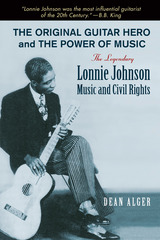
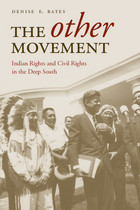
In recalling political activism in the post-World War II South, rarely does one consider the political activities of American Indians as they responded to desegregation, the passing of the Civil Rights Acts, and the restructuring of the American political party system. Native leaders and activists across the South created a social and political movement all their own, which drew public attention to the problems of discrimination, poverty, unemployment, low educational attainment, and poor living conditions in tribal communities.
While tribal-state relationships have historically been characterized as tense, most southern tribes—particularly non-federally recognized ones—found that Indian affairs commissions offered them a unique position in which to negotiate power. Although individual tribal leaders experienced isolated victories and generated some support through the 1950s and 1960s, the creation of the inter-tribal state commissions in the 1970s and 1980s elevated the movement to a more prominent political level. Through the formalization of tribal-state relationships, Indian communities forged strong networks with local, state, and national agencies while advocating for cultural preservation and revitalization, economic development, and the implementation of community services.
This book looks specifically at Alabama and Louisiana, places of intensive political activity during the civil rights era and increasing Indian visibility and tribal reorganization in the decades that followed. Between 1960 and 1990, U.S. census records show that Alabama’s Indian population swelled by a factor of twelve and Louisiana’s by a factor of five. Thus, in addition to serving as excellent examples of the national trend of a rising Indian population, the two states make interesting case studies because their Indian commissions brought formerly disconnected groups, each with different goals and needs, together for the first time, creating an assortment of alliances and divisions.
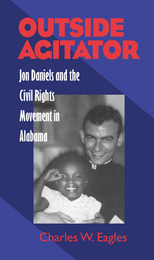
Outside Agitator tells the dramatic, largely forgotten storybehind the 1965 killing of civil rights worker Jonathan Myrick "Jon" Daniels in Lowndes County, Alabama, detailing the lives of the killer and the victim. A white Episcopal seminary student from New Hampshire, Jon Daniels helped organize blacks in Selma during the events that led to the Selma-to-Montgomery march. In August 1965 he was fatally shot in neighboring Lowndes County by Tom Coleman, a highway department engineer and steadfast segregationist, who was later acquitted by an all-white jury.
Lowndes County was a bastion of white minority dominance. For half a century, no black had voted or served on a jury there. Known for the violence used by whites to maintain their control, "bloody" Lowndes presented Daniels and other civil rights workers with almost insurmountable obstacles. Tom Coleman, a Lowndes County native, represented the consensus among local whites that violent resistance to racial change was justified. To defend his community and to prevent change, he resorted to violence against "outside agitators."
Following the deaths of a score of other civil rights workers, the killing of Jon Daniels was in many ways the last atrocity of the first, southern, nonviolent phase of the Civil Rights movement. This exploration of how Daniels and Coleman came to be at opposite ends of a shotgun outside a county store captures the mechanics and emotions of forces promoting and resisting change in southern race relations. Charles Eagles reminds us that however representative Daniels and Coleman may have been of larger forces, they were nevertheless real individuals with distinctive personalities caught up in specific circumstances.

Virginia Foster Durr is the daughter of a Presbyterian minister, and she was raised in Birmingham during the early years of this century. She attended Wellesley for two years, until her family’s circumstances made it impossible for her to continue. Virginia’s sister Josephine married Hugo Black; and in 1926 Virginia married a young lawyer named Clifford Durr. The Durrs moved to Washington shortly after Roosevelt’s inauguration, and Clifford was one of the “bright young lawyers” whom the new president relied upon to draft the legislation establishing the New Deal. After World War II the Durrs moved to Denver, then to Montgomery, where Clifford became one of the few white lawyers to represent blacks in civil rights cases. During the Durrs’ Washington years Virginia had been active in the movement to abolish the poll tax and in to her liberal causes; and back in Montgomery, she shared Clifford’s commitment to the civil rights movement and served as an inspiration to liberals of both races.
Virginia Durr has succeeded in articulating the pleasures and the difficulties of growing up female in the vigorous young city of Birmingham; the broadening (and in some ways also restricting) of young women’s intellectual horizons and social life at Wellesley; and the excitement of the courtship and marriage of a proper young Southern girl of good family and poor circumstance. She brings to life the social and political climate of Washington during the New Deal and war years, where her close connection to Justice Black gave the Durrs access to people whom they might not have come to know otherwise. A victim of McCarthyism, Clifford returned with Virginia to Montgomery with no job and few prospects. Their decision to become engaged in the civil rights struggle was consistent with their lifelong commitment to follow their consciences, regardless of the social and economic consequences.
“Virginia Durr said it: there were three ways for a well brought-up young Southern white woman to go.
She could be the actress, playing out the stereotype of the Southern belle. Gracious to ‘the colored help,’ flirtatious to her powerful father-in-law, and offering a sweet, winning smile to the world. In short, going with the wind.
If she had a spark of independence or worse, creativity, she could go crazy—on the dark, shadowy street traveled by more than one Southern belle.
Or she could be the rebel. She could step outside the magic circle, abandon privilege, and challenge this way of life. Ostracism, bruised of all sorts, and defamation would be her lot. Her reward would be a truly examined life. And a world she would otherwise never have known.” — from the Foreword by Studs Terkel
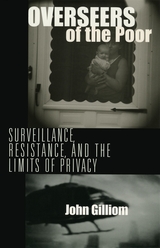
This powerful book lets us in on the conversations of low-income mothers from Appalachian Ohio as they talk about the welfare bureaucracy and its remarkably advanced surveillance system. In their struggle to care for their families, these women are monitored and assessed through a vast network of supercomputers, caseworkers, fraud control agents, and even grocers and neighbors.
In-depth interviews show that these women focus less on the right to privacy than on a critique of surveillance that lays bare the personal and political conflicts with which they live. And, while they have little interest in conventional forms of politics, we see widespread patterns of everyday resistance as they subvert the surveillance regime when they feel it prevents them from being good parents. Ultimately, Overseers of the Poor demonstrates the need to reconceive not just our understanding of the surveillance-privacy debate but also the broader realms of language, participation, and the politics of rights.
We all know that our lives are being watched more than ever before. As we struggle to understand and confront this new order, Gilliom argues, we need to spend less time talking about privacy rights, legislatures, and courts of law and more time talking about power, domination, and the ongoing struggles of everyday people.
READERS
Browse our collection.
PUBLISHERS
See BiblioVault's publisher services.
STUDENT SERVICES
Files for college accessibility offices.
UChicago Accessibility Resources
home | accessibility | search | about | contact us
BiblioVault ® 2001 - 2024
The University of Chicago Press


